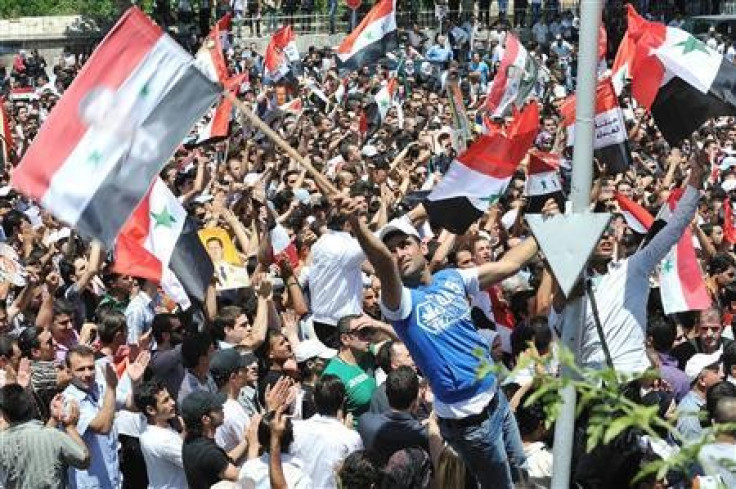Syria: French Embassy forces fire into the air as protests intensify

Recent reports from Syria allege that security guards at the French Embassy have fired into the air to drive back protesters taking part in demonstrations outside the French and American embassies in Damascus.
The protests on Monday followed the U.S. and French ambassadors visit of the opposition stronghold of Hama in central Syria, a move publicly criticised by the Assad regime.
U.S Ambassador Ford and French Ambassador Eric Chevallier travelled to Hama Thursday and Friday to show solidarity with its residents who have come under attack from government forces after staging anti regime protests.
However, while analysts say the visits should be interpreted as a strong diplomatic warning against escalating violence in the central city; Syria's foreign ministry described it as a "flagrant interference" in the country's internal affairs and an attempt to undermine its stability.
Today, according to reports, being prevented from approaching the U.S embassy, Pro-Assad supporters instead turned to the French embassy where more than 300 people are said to have gathered, while hundreds others were at the American diplomatic compound.
The protests coincide with government-organized talks in Damascus on possible political reforms after four months of unrest against the regime of President Bashar Assad.
During the first day of talks on Sunday, a number of speakers condemned the government's security forces and its violence against protesters, but others repeated Assad's contention that foreign agitators are attempting to destabilize Syria.
While supporters of the regime gathered in Damascus, more incriminating reports on the Syrian regime emerged, as right activists said that Syrian troops stormed into the country's third-largest city with armoured personnel carriers and heavy machine guns.
Activists insist that at least two people were killed and 20 wounded in the attacks in Homs, where anti-Assad demonstrations refuse to die down.
On Sunday, following four months of unrest, Vice President Farouk al-Sharaa called for a transition to democracy as the country has been ruled for four decades by the Assad family under authoritarian style regimes.
However while the government has agreed to organise talks, the situation is not set to improve rapidly or to produce a breakthrough since the main anti-government factions have boycotted the meeting.
Many, in the opposition, say that trust in the regime has been lost and leaders therefore call for the unequivocal and immediate stepping down of Assad.
The two days of meeting nonetheless constitute a major concession from the Syrian regime and only came after some 1,600 civilians and 350 members of security forces died since demonstrations began in March, according to rights groups.
In Homs, according to the Associated Press, clashes occurred after security forces killed the son of an anti-regime tribal leader on Sunday and the unrest lasted until 5 a.m. (0200 GMT) Monday.
Rami Abdul-Rahman, the London-based director of the Syrian Observatory for Human Rights, backed up the activists claim and also said forces pushed into parts of Homs.
Also Monday, the state-run news agency SANA reported that Assad named Anas Abdul-Razzaq Naem as a new governor of the central city of Hama, which has been out of government control since early June.
Naem replaced Ahmed Khaled Abdul-Aziz, who was fired earlier this month after he allowed protesters to stage a huge rally in the city earlier this month.
The new governor is the secretary general of the Baath party branch at Hama and the head of the doctors' association in the city.
© Copyright IBTimes 2024. All rights reserved.






